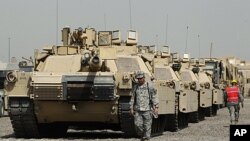The Obama administration is defending the announced total withdrawal of U.S. troops from Iraq by the end of the year, amid strong criticism from the president’s domestic political opponents.
More than eight years after the U.S.-led invasion of Iraq, the last American forces will soon be departing. Secretary of State Hillary Clinton says the pullout is consistent with commitments made by President Barack Obama and his predecessor who ordered the invasion, George W. Bush.
“President Obama said that combat troops would leave Iraq by the end of this year. But before he ever said that, the Bush administration also committed to withdrawing all troops by the end of this year. So you have a bipartisan commitment, and that was viewed as appropriate," she said.
Watch a related report by Marissa Melton:
Clinton spoke on the U.S. television program Fox News Sunday. She stressed the United States has no intention of abandoning Iraq. “What we have agreed to is a support-and-training mission similar to what we have in countries from Jordan to Colombia. And we will be working with the Iraqis. We will also have a very robust diplomatic presence," she said.
But that is not good enough, according to President Obama’s Republican critics. Senator Lindsey Graham of South Carolina also appeared on Fox News Sunday. “Not being able to close the deal in Iraq [negotiate an extension of U.S. troops] is a very serious mistake. Celebrating leaving with no troops behind is a serious mistake," he said.
Graham accused the president of placing political considerations ahead of America’s long-term security objectives. He disputed any suggestion that Iraq is ready to stand on its own, particularly with regard to its neighbor, Iran. “Iraqis have no air force. They have no intelligence-gathering capability. They need counter-terrorism assistance. There are missions only we can do. The [U.S.] military commander said we needed 15,000 to 18,000 [troops in Iraq]. We have none [after this year]. It was the Obama administration’s job to end this well. They failed," he said.
Secretary of State Clinton said the United States will retain a robust military presence in the Middle East, even after the last troops leave Iraq. She said no nation, including Iran, should doubt America’s resolve to support Iraq’s democracy.
In the end, she said, it was Iraq’s decision to insist on a complete U.S. troop withdrawal. “The point of our involvement in Iraq was to create the opportunity for the Iraqis to have their own future without the oppression of a dictator like Saddam Hussein. Now you cannot, on the one hand, say you are all for democracy and sovereignty and independence, and on the other hand say that when a choice is made that is validated by the current government in Iraq, that that somehow is not appropriate. That is what we were there for - to give the Iraqi people the chance to make their own decisions," she said.
Last week, President Obama said he was keeping a promise to end the war in Iraq, but added “the United States will continue to have an interest in an Iraq that is stable, secure and self-reliant”.




